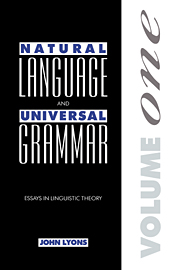Book contents
- Frontmatter
- Contents
- Preface
- Typographical conventions
- 1 Language, speech and writing
- 2 In defence of (so-called) autonomous linguistics
- 3 Linguistic theory and theoretical linguistics
- 4 Natural, non-natural and unnatural languages: English, Urdu and other abstractions
- 5 The origin of language, speech and languages
- 6 Phonemic and non-phonemic phonology: some typological reflections
- 7 Towards a ‘notional’ theory of the ‘parts of speech’
- 8 Deixis as the source of reference
- 9 Deixis and anaphora
- Appendix: The scientific study of language. Inaugural Lecture, Edinburgh, 1965
- Notes
- References
- Subject index
- Names index
9 - Deixis and anaphora
Published online by Cambridge University Press: 05 June 2012
- Frontmatter
- Contents
- Preface
- Typographical conventions
- 1 Language, speech and writing
- 2 In defence of (so-called) autonomous linguistics
- 3 Linguistic theory and theoretical linguistics
- 4 Natural, non-natural and unnatural languages: English, Urdu and other abstractions
- 5 The origin of language, speech and languages
- 6 Phonemic and non-phonemic phonology: some typological reflections
- 7 Towards a ‘notional’ theory of the ‘parts of speech’
- 8 Deixis as the source of reference
- 9 Deixis and anaphora
- Appendix: The scientific study of language. Inaugural Lecture, Edinburgh, 1965
- Notes
- References
- Subject index
- Names index
Summary
The topic that I have chosen to talk about – the relationship between deixis and anaphora – turns out to be even more appropriate than I had hoped. Dr Bullowa, Dr Widdowson and Professor Halliday have all touched upon either deixis or anaphora, or both, in their contributions to the Symposium; and they have all made points to which I can refer in the development of the thesis that I am presenting.
I will argue that deixis is both ontogenetically and logically prior to anaphora. By this I mean that the deictic use of pronouns and other such expressions precedes their anaphoric use in the earliest stages of language acquisition and, furthermore, that anaphora, as a grammatical and semantic process, is inexplicable except in terms of its having originated in deixis. That deixis precedes, and is in some sense more basic than anaphora, is something that the previous speakers would probably concede immediately. But it is not at all uncommon for linguists to describe the meaning of pronouns, as far as possible, in terms of anaphora and to treat that part of the use of pronouns which is irreducibly deictic as a theoretical embarrassment that is best forgotten. It is certainly the case that generative grammarians have been inclined, until recently at least, to underestimate the role played by deixis in the interpretation of utterances; and the very term ‘pronominalization’, which figures so prominently in works on generative grammar, is loaded in favour of the view that pronouns are, first and foremost, substitutes for nouns (or nominals).
- Type
- Chapter
- Information
- Natural Language and Universal GrammarEssays in Linguistic Theory, pp. 166 - 178Publisher: Cambridge University PressPrint publication year: 1991
- 2
- Cited by



